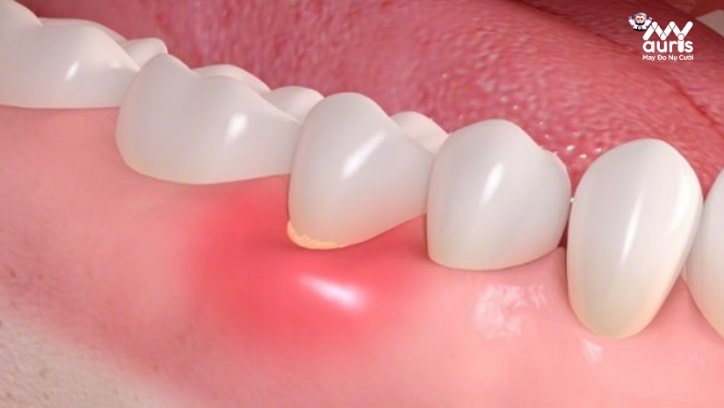Gingivitis is a common condition in adults and children, especially adults over 30 years old, accounting for about half of people with gingivitis. So what are the signs of gingivitis and how to effectively treat it? The article below will help readers find specific treatment methods.
What is gingivitis? Signs of recognition
Gingivitis (also known as gingivitis) is a condition in which plaque contains bacteria and sticks to the crown of the tooth, causing inflammation of the gingival tissue. When plaque remains on teeth for too long, we can easily see the gums becoming irritated, inflamed, red, swollen and exuding fluid. Besides, it will weaken tooth enamel.
Gingivitis is a common oral disease and causes little pain in the early stages, so many people do not pay much attention to their oral health. However, the patient needs to be treated promptly because gingivitis will develop into periodontitis and cause tooth loss.
To identify whether the patient has gingivitis or not, let’s learn about the signs of gingivitis, specifically:
- Red, swollen gums;
- Gum pain;
- Bleeding gums;
- Purulent gingivitis;
- Bad breath;
- Gingival recession;
- Gingiv ulcers;
- Teeth are easily sensitive to hot or cold foods;
- Toothache when chewing food;
With any of the above signs of gingivitis, go to the clinic immediately to be examined and given appropriate treatment methods for the patient.

Causes of gingivitis
Gingivitis is a disease related to the tissue organization around the tooth root, and comes from inflammation of the gums and alveolar bone. Furthermore, when periodontal bBacterial attack will cause this condition to gradually weaken and be unable to protect the tooth crown, causing the tooth neck and root to become loose. More seriously, if not treated promptly, it can lead to extremely dangerous tooth loss.
According to dentists, there are many causes of inflamed gum tissue around teeth such as:
- Improper oral hygiene: This will cause leftover food to not be completely removed, and over time plaque will form, causing bacteria to accumulate, causing inflammation;
- Improper diet: Chewing too much hard or hot foods can damage your gums. In addition, this will cause loss of connection with the tooth crown, creating gaps for bacteria to penetrate and cause inflammation around the tooth root;
- Infection can form due to being affected by a number of oral diseases such as bleeding gums, tooth decay, pulpitis, etc. At that time, bacteria in the oral cavity will become active and attack and destroy tissues around the teeth, causing this area to become infected;
- Some medications to treat cardiovascular diseases, blood pressure or diabetes, etc. can also cause side effects. At the same time, it affects oral health and causes gingivitis;
Dangerous effects of gingivitis
When in the initial stage, periodontitis often has no serious signs and is easily ignored and subjective. Until the condition of gingivitis becomes severe and lasts for a long time, people will pay attention to their oral health. At this time, gingivitis is in a dangerous stage.
However, if this condition is not treated promptly and properly, it will cause dangerous complications such as:
- Risk of tooth loss due to inflammation developing too quickly, causing the gums to almost lose connection with the tooth roots. At that time, the teeth will become loose, easily shaken and susceptible to breaking and falling out;
- Risk of pulpitis due to bacteria entering the pulp area, which will infect the pulp and spread to the tip of the tooth. Then, destroy the tooth pulp organizations.
- Risk of cardiovascular disease and myocardial infarction because this condition will cause inflammation of the gum tissue, allowing bacteria to enter the vascular system;
- Prolonged inflammation without treatment will produce prostaglandin, causing dilation of the uterine sphincter, making women susceptible to premature birth, especially in the first 3 months of pregnancy.
In short, inflammation of the organizations around the tooth root will affect the patient’s health and spirit. Furthermore, to prevent complications, go to a dental facility when you have signs of periodontal inflammation such as redness and swelling of the gums, pain, etc.

Methods to treat gingivitis
When suffering from gingivitis, patients should not arbitrarily treat it at home or apply some of the tips specifically instructed above. Instead, you need to go to the dentist to be examined, determine the inflammation and advise on a suitable treatment regimen.
- In the early stages, when gingivitis is mild, the doctor will clean and remove harmful bacteria in the oral cavity. Normally, the doctor will perform dental scaling and oral cleaning with specialized medical equipment;
- When inflammation has formed a pocket of pus or tooth abscess, the doctor will now perform surgery to remove the pus. Inflammation at the tooth root when there is pus needs to be treated as soon as possible to avoid spreading and directly affecting the tooth;
- In the severe stage, large pockets of inflammation and bacteria have destroyed almost the entire tooth root, the tooth needs to be removed to avoid affecting other teeth. At the same time, the doctor will perform dental restoration techniques to ensure the patient’s chewing ability as well as oral health;

How to prevent gingivitis?
The best way to prevent complications is to protect oral health so that periodontal inflammation does not form. Some measures to prevent gingivitis:
- You should take scientific and regular dental care every day by brushing and rinsing your mouth regularly;
- Use dental floss and gum picks to remove food scraps and remaining plaque on teeth and tongue to help prevent bacteria from accumulating;
- Build a suitable nutritional regimen limit foods that are too spicy, too hot, too chewy, hard, foods that contain a lot of sugar or are highly acidic;
- Supplement essential nutrients and eat lots of green vegetables and fruits;
- Regularly examine your teeth, have your teeth scaled every 6 months, and treat dental diseases (if any).
Gingivitis is one of the diseases that is harmful to your oral health. To prevent this condition, take care of your teeth properly at least twice a day, combined with the use of dental floss and mouthwash. If you need more information or want to schedule an appointment, please contact My Auris dentistry immediately for quick and completely free expert support!
Kim Dung





